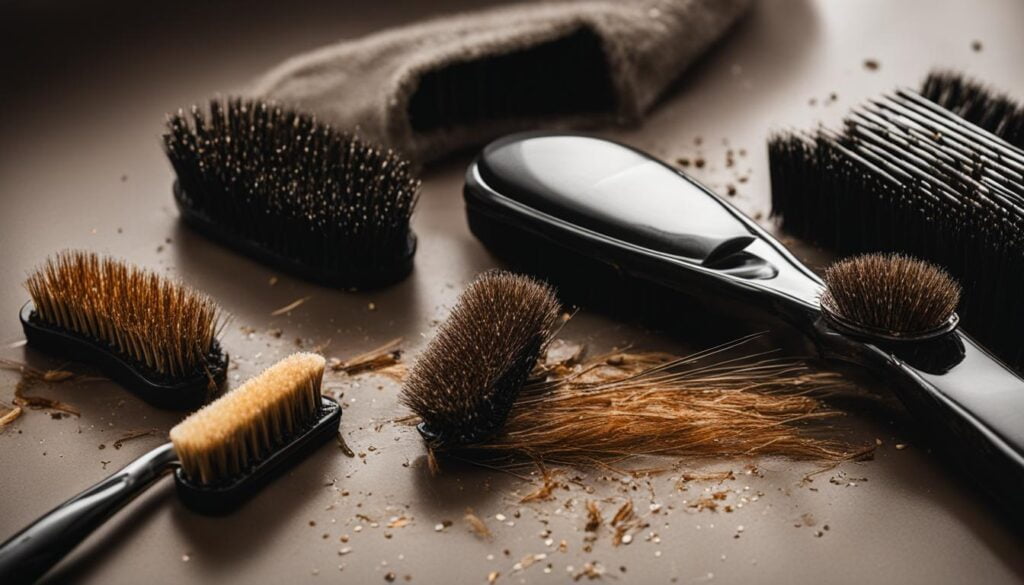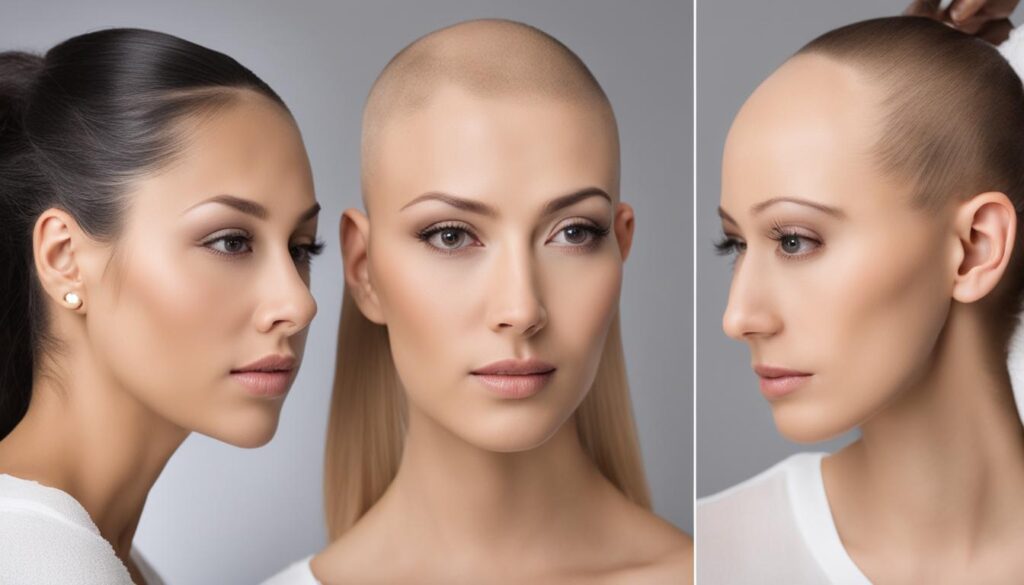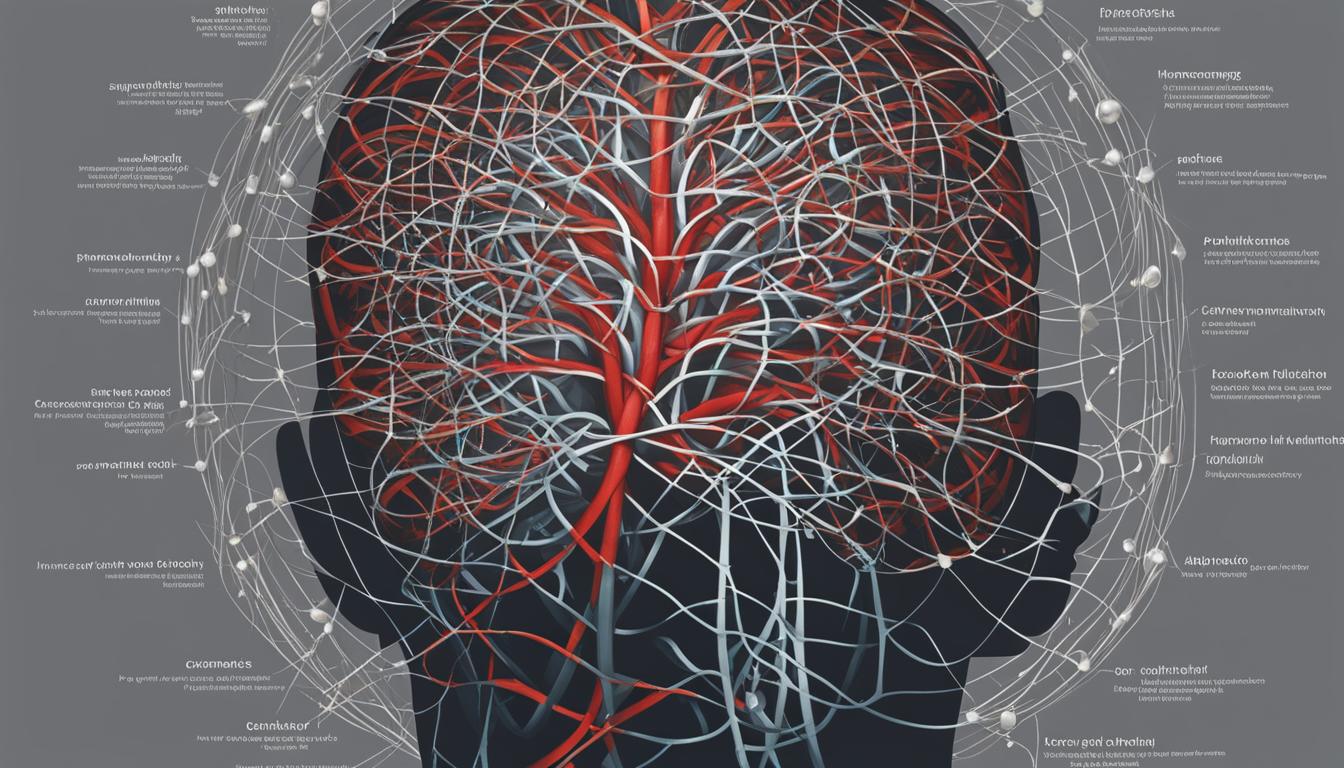Why is my hair falling out like crazy?
Are you concerned about excessive hair shedding and thinning? Hair loss, also known as alopecia, can occur for various reasons, including stress, hormonal changes, environmental factors, and underlying health conditions. Understanding the underlying cause is crucial for effective treatment and hair regrowth. In this article, I will explore the different causes of hair loss and the available treatment options.
Key Takeaways:
- Hair loss can be caused by stress, hormonal changes, environmental factors, and underlying health conditions.
- Treatment options for hair loss include medications, red light therapy, and hair transplant.
- Stress-related hair loss, known as telogen effluvium, can be managed by incorporating stress-reducing techniques.
- Certain styling habits like tight hairstyles and excessive use of heat styling tools can contribute to hair loss.
- Hormonal changes, such as those related to birth control and menopause, can affect hair growth and lead to hair loss.
Stress-Related Hair Loss
Stress can have a significant impact on hair health, leading to excessive shedding and thinning. This type of hair loss is known as telogen effluvium and is triggered by significant stressors such as major life events or illness. When the body undergoes stress, hair follicles can prematurely enter the resting phase of the hair growth cycle, leading to increased hair shedding. Managing stress is crucial in treating and preventing stress-related hair loss.
“Stress can be a major factor contributing to hair shedding, known as telogen effluvium.”
To effectively manage stress and promote hair regrowth, it’s important to incorporate stress-reducing techniques into your daily routine. This can include practices such as meditation, deep breathing exercises, and getting enough sleep. Regular exercise and maintaining a balanced diet can also help reduce stress levels. Seeking help from a mental health professional can provide additional support and guidance in managing stress and its impact on hair health.
“Managing stress is crucial in treating and preventing stress-related hair loss.”
By implementing these stress management strategies, individuals can address the underlying cause of stress-related hair loss and support healthy hair regrowth.
Tips for Managing Stress-Related Hair Loss:
- Practice stress-reducing techniques such as meditation and deep breathing exercises.
- Get enough sleep and maintain a regular sleep routine.
- Engage in regular exercise to release endorphins and reduce stress levels.
- Eat a balanced diet rich in vitamins and minerals to support overall health.
- Seek help from a mental health professional to address underlying stressors.
Styling Habits and Hair Loss
Hair styling can be a way to express our personality and enhance our appearance. However, certain styling habits can contribute to hair loss and damage in the long run. One common cause of hair loss due to styling is traction alopecia. This occurs when hairstyles like tight braids, ponytails, or buns constantly pull on the hair, causing stress and damage to the hair follicles. Over time, this can lead to hair breakage and thinning.
Excessive use of heat styling tools such as blow dryers, flat irons, and curling irons can also cause hair damage. The high temperatures from these tools can weaken the hair shaft, making it more prone to breakage and hair loss. Similarly, chemical treatments like bleaching, dyeing, relaxing, and using hair sprays can damage the hair and make it more susceptible to breakage.
To prevent hair loss from styling habits, it’s important to adopt healthy hair care practices. Avoid tight hairstyles that pull on the hair too tightly, and opt for looser styles that don’t cause excessive tension on the hair follicles. Limit the use of heat styling tools and always use a heat protectant spray before using them. Choose gentle hair care products that are free from harsh chemicals. Lastly, it’s important to give your hair regular breaks from styling and allow it to air dry naturally whenever possible.

Hormonal Changes and Hair Loss
Hormonal changes can have a significant impact on hair growth and may contribute to hair loss. In this section, we will explore three key aspects of hormonal-related hair loss: hormonal birth control, postpartum hair loss, and menopausal hair loss.
Hormonal Birth Control and Hair Loss
For individuals using hormonal birth control methods such as oral contraceptives, patches, injections, vaginal rings, or implants, hair loss can sometimes be a potential side effect. This is more likely to occur in individuals with a family history of hair loss. It is important to note that not all individuals using hormonal birth control will experience hair loss, and the severity of hair loss can vary. If you are concerned about hair loss while using hormonal birth control, it is recommended to consult with your healthcare provider to discuss alternative options or adjust your current method.
Postpartum Hair Loss
After childbirth, many women experience postpartum hair loss, also known as telogen effluvium. This occurs due to hormonal changes and the body’s adjustment after pregnancy. During pregnancy, elevated hormone levels prolong the growth phase of the hair cycle, resulting in thick and lustrous hair. However, after giving birth, hormone levels normalize, and a significant number of hairs enter the resting phase, leading to increased shedding. Postpartum hair loss typically occurs around three to six months after delivery and resolves on its own within several months. While there is no specific treatment for postpartum hair loss, maintaining a healthy lifestyle, managing stress, and ensuring proper nutrition can support hair regrowth.
Menopausal Hair Loss
Hair thinning and loss are commonly experienced during menopause due to hormonal fluctuations. As estrogen levels decline, hair follicles may become more sensitive to androgens, resulting in hair miniaturization and eventual hair loss. Menopausal hair loss typically presents as overall thinning rather than complete baldness. In addition to hormone replacement therapy, there are various treatment options available to manage menopausal hair loss, including minoxidil (Rogaine), low-level laser therapy, and medications that block androgens. It is recommended to consult with a healthcare provider to determine the most suitable treatment approach for managing menopausal hair loss.
In conclusion, hormonal changes can have a significant impact on hair growth and may contribute to hair loss. From hormonal birth control to postpartum hair loss and menopausal hair loss, understanding the potential effects of hormonal fluctuations is essential in managing and treating hair loss. If you are experiencing hair loss related to hormonal changes, it is always best to consult with a healthcare professional who can provide a proper diagnosis and recommend appropriate treatment options.
Underlying Health Conditions and Hair Loss
Hair loss can be caused by various underlying health conditions. Understanding the connection between these conditions and hair loss is crucial for effective treatment and prevention. Some common factors to consider include:
- Thyroid Disorders and Hair Loss: Thyroid imbalances, such as hyperthyroidism or hypothyroidism, can disrupt the hair growth cycle and lead to excessive shedding. It’s important to consult with a healthcare professional to diagnose and manage any thyroid-related issues.
- Nutrient Deficiencies: Low levels of essential nutrients like iron, B vitamins, and vitamin D can negatively impact hair health and contribute to hair loss. A balanced diet and possibly supplements under medical supervision can help address these deficiencies and promote hair regrowth.
- Medication-Related Hair Loss: Certain medications, including chemotherapy drugs, antibiotics, antidepressants, and blood pressure medications, can have hair loss as a potential side effect. If you suspect that your medication is causing hair loss, consult with your healthcare provider to explore alternative options or potential solutions.
Proper diagnosis and treatment of these underlying health conditions can help prevent and treat hair loss. Consulting with a healthcare professional is crucial to determine the best course of action for your specific situation.

Remember, addressing the underlying cause of hair loss is essential for effective treatment. Whether it’s thyroid disorders, nutrient deficiencies, or medication-related hair loss, seeking professional advice can help you navigate the journey towards healthy hair.
Types of Alopecia

Alopecia refers to various types of hair loss conditions that can affect individuals. Understanding the different types of alopecia is crucial for proper diagnosis and treatment. In this section, we will explore three common types of alopecia: alopecia areata, traction alopecia, and androgenetic alopecia.
Alopecia areata is an autoimmune disease that causes patchy hair loss on the scalp or body. It occurs when the body’s immune system mistakenly attacks the hair follicles, leading to hair loss in small, round patches. The exact cause of alopecia areata is unknown, but it is believed to be a combination of genetic and environmental factors.
Traction alopecia is a type of hair loss that occurs due to constant tension on the hair. It is commonly caused by hairstyles that pull the hair tightly, such as braids, ponytails, or hair extensions. Over time, this constant pulling can damage the hair follicles and result in hair loss, particularly along the hairline and in areas where the hair is pulled tightly. Traction alopecia can be prevented by avoiding tight hairstyles and allowing the hair to rest and recover.
Androgenetic alopecia, also known as male or female pattern baldness, is the most common type of hair loss. It is a hereditary condition that causes gradual hair thinning and loss. In men, androgenetic alopecia typically begins with a receding hairline and thinning crown, while in women, it often leads to overall thinning of the hair. Hormonal factors and genetic predisposition play a significant role in androgenetic alopecia. Treatment options for androgenetic alopecia include medications, hair transplant surgery, and lifestyle changes.
Proper diagnosis and consultation with a healthcare professional or dermatologist are essential for determining the specific type of alopecia and developing an appropriate treatment plan. Understanding the underlying cause and receiving targeted treatment can help manage and treat alopecia effectively.
Conclusion
Hair loss can be a distressing condition, but there are various causes and treatment options available. Understanding the underlying cause of hair loss is essential for effective treatment. Whether it is stress-related, hormonal, styling habits, underlying health conditions, or specific types of alopecia, seeking professional advice and appropriate treatment can help address the issue and promote hair regrowth. It’s important to consult with a healthcare professional for a proper diagnosis and personalized treatment plan.
FAQ
What are the causes of hair loss?
Hair loss can occur due to various reasons, including stress, hormonal changes, environmental factors, underlying health conditions, hereditary factors, age-related factors, and certain medications.
How much hair loss is normal?
The shedding of around 50 to 100 hairs per day is considered normal. However, if you are experiencing excessive hair shedding or thinning, it may indicate an underlying issue.
What are the treatment options for hereditary hair loss?
Treatment options for hereditary hair loss include medications like Rogaine and Propecia, red light therapy, spironolactone, and hair transplant. It’s important to consult with a healthcare professional to determine the best treatment option for you.
Can stress cause hair loss?
Yes, stress can be a major factor contributing to hair shedding. This type of hair loss is known as telogen effluvium. Managing stress through stress-reducing techniques and seeking help from a mental health professional can help manage stress-related hair loss.
Can styling habits contribute to hair loss?
Yes, certain styling habits like tight hairstyles or excessive use of heat styling tools can contribute to hair loss. Traction alopecia and heat damage are common causes of hair loss from styling habits. It’s important to choose gentle hair care products, avoid tight hairstyles, and limit the use of heat styling tools to prevent hair loss.
Can hormonal changes affect hair growth?
Yes, hormonal changes can affect hair growth and contribute to hair loss. Hormonal birth control methods and postpartum hormonal changes can sometimes trigger hair loss. Menopausal hormonal changes can also lead to hair thinning and shedding. Consulting with a healthcare professional can help determine the best treatment options for hormonal-related hair loss.
What underlying health conditions can cause hair loss?
Underlying health conditions such as thyroid disorders and nutrient deficiencies can disrupt the hair growth cycle and lead to hair loss. Certain medications can also have hair loss as a potential side effect. Proper diagnosis and treatment of any underlying health condition, as well as addressing nutrient deficiencies, can help prevent and treat hair loss.
What are the different types of alopecia?
There are different types of alopecia that can cause hair loss. Alopecia areata is an autoimmune disease where the body’s immune system attacks the hair follicles, leading to patchy hair loss. Traction alopecia occurs due to repeated tension on the hair caused by tight hairstyles. Androgenetic alopecia is the most common type of hair loss in both men and women and is commonly known as male or female pattern baldness.







